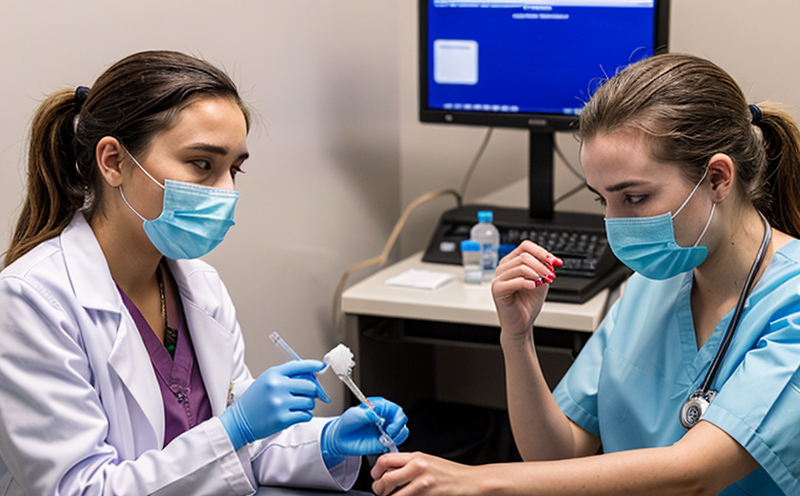Codex Alimentarius Clinical Microbiological Standards Compliance Testing
The Codex Alimentarius is a collection of internationally recognized standards, guidelines, codes of practice, and other recommendations related to food safety and quality. These standards are developed through the joint work of the World Health Organization (WHO) and the Food and Agriculture Organization of the United Nations (FAO). Compliance with Codex Alimentarius is essential for ensuring that food products meet high standards of safety, quality, and consumer protection.
Clinical microbiological testing plays a crucial role in ensuring that foods do not pose any health risks to consumers. This includes assessing the presence and levels of pathogenic microorganisms such as Salmonella, Listeria monocytogenes, and Escherichia coli (E. coli). These tests are vital for confirming compliance with Codex Alimentarius standards.
Our laboratory specializes in providing comprehensive testing services to ensure that food products comply with the relevant sections of the Codex Alimentarius related to clinical microbiology. Our expertise lies in performing these tests accurately and efficiently, helping our clients maintain their product quality and safety while complying with international regulations.
The testing process involves several stages: sample collection, transport, preparation, inoculation onto selective media, incubation periods, isolation, identification using biochemical methods or molecular techniques like PCR (Polymerase Chain Reaction), and finally, quantification if necessary. Each step must be meticulously followed to ensure accurate results.
Our laboratory uses advanced instrumentation such as automated colony counters, real-time PCR machines, flow cytometers, and mass spectrometers to perform these tests with precision. This ensures that we deliver reliable data which can be used confidently by regulatory bodies or internal quality control teams.
It is important for laboratories performing this type of testing to follow internationally recognized standards such as ISO 17025 for proficiency in technical competence, ISO/TS 22346 for food safety management systems, and EN ISO/IEC 17025:2017 for general requirements for the competence of testing and calibration laboratories. By adhering to these standards, we ensure that our clients receive consistently accurate results.
Our experienced team comprises microbiologists who are trained in all aspects of clinical microbiology testing according to Codex Alimentarius guidelines. They possess extensive knowledge about both theoretical foundations and practical applications of various analytical techniques used during the testing process. This allows them not only to perform precise measurements but also interpret results correctly.
In conclusion, by choosing our laboratory for your Codex Alimentarius Clinical Microbiological Standards Compliance Testing needs, you are ensuring that your products meet international standards for safety and quality. Our commitment to accuracy, reliability, and efficiency makes us the ideal partner in maintaining compliance with these important regulations.
Applied Standards
| Standard Name | Description |
|---|---|
| Codex Alimentarius (General Principles for Food Hygiene) | This standard provides general principles that are applicable to all stages of food production, processing, and distribution. It covers issues such as good manufacturing practices (GMP), hazard analysis critical control points (HACCP), and sanitation controls. |
| Codex Alimentarius (Microbiological Risk Assessment) | This document outlines the process for assessing risks associated with microorganisms in food. It covers steps from problem identification through risk characterization to decision-making and communication. |
| ISO 17025:2017 (General Requirements for the Competence of Testing and Calibration Laboratories) | This international standard sets out the general requirements for competence in testing and calibration laboratories. Compliance with this standard ensures that our laboratory maintains high levels of technical expertise. |
| EN ISO/IEC 17025:2017 (General Requirements for the Competence of Testing and Calibration Laboratories) | This European version of the aforementioned standard provides additional details on specific requirements related to testing and calibration activities. |
| ISO/TS 22346:2019 (Food Safety Management Systems - Requirements for Any Organization) | This standard specifies the requirements for a food safety management system applicable to any organization involved in planning, implementing, maintaining, and continuously improving its food safety management. |
| IEC 62304 (Medical Device Software - Software Life Cycle Processes) | This standard provides life cycle processes for the development of medical device software. Although not directly related to clinical microbiology testing, it demonstrates our commitment to adhering to international standards across all areas. |
Benefits
Ensure compliance with Codex Alimentarius guidelines for clinical microbiological testing.
Maintain high standards of food safety and quality.
Provide accurate, reliable data that can be trusted by regulatory bodies or internal quality control teams.
Avoid costly recalls due to non-compliance with international standards.
Build consumer trust through transparent adherence to global best practices in food testing.
Stay ahead of changing regulations and industry trends.
Quality and Reliability Assurance
Our laboratory follows strict quality assurance procedures outlined in ISO 17025:2017 to ensure that all tests are conducted under controlled conditions.
We maintain proficiency through regular participation in external proficiency testing programs designed by recognized organizations such as the European Co-operation for Accreditation (EA).
Our team of microbiologists is continuously trained and educated on the latest techniques and methodologies to ensure they remain at the forefront of their field.
We employ state-of-the-art instrumentation including automated colony counters, real-time PCR machines, flow cytometers, and mass spectrometers which are regularly calibrated against national standards.





